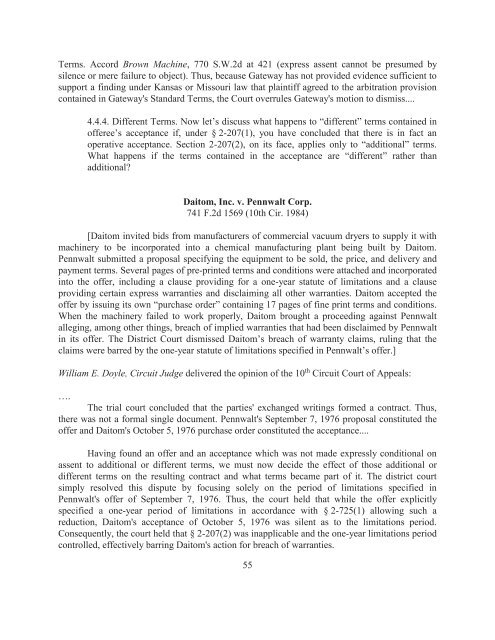Sales and Leases - A Problem-based Approach, 2016a
Sales and Leases - A Problem-based Approach, 2016a
Sales and Leases - A Problem-based Approach, 2016a
You also want an ePaper? Increase the reach of your titles
YUMPU automatically turns print PDFs into web optimized ePapers that Google loves.
Terms. Accord Brown Machine, 770 S.W.2d at 421 (express assent cannot be presumed by<br />
silence or mere failure to object). Thus, because Gateway has not provided evidence sufficient to<br />
support a finding under Kansas or Missouri law that plaintiff agreed to the arbitration provision<br />
contained in Gateway's St<strong>and</strong>ard Terms, the Court overrules Gateway's motion to dismiss....<br />
4.4.4. Different Terms. Now let’s discuss what happens to “different” terms contained in<br />
offeree’s acceptance if, under § 2-207(1), you have concluded that there is in fact an<br />
operative acceptance. Section 2-207(2), on its face, applies only to “additional” terms.<br />
What happens if the terms contained in the acceptance are “different” rather than<br />
additional?<br />
Daitom, Inc. v. Pennwalt Corp.<br />
741 F.2d 1569 (10th Cir. 1984)<br />
[Daitom invited bids from manufacturers of commercial vacuum dryers to supply it with<br />
machinery to be incorporated into a chemical manufacturing plant being built by Daitom.<br />
Pennwalt submitted a proposal specifying the equipment to be sold, the price, <strong>and</strong> delivery <strong>and</strong><br />
payment terms. Several pages of pre-printed terms <strong>and</strong> conditions were attached <strong>and</strong> incorporated<br />
into the offer, including a clause providing for a one-year statute of limitations <strong>and</strong> a clause<br />
providing certain express warranties <strong>and</strong> disclaiming all other warranties. Daitom accepted the<br />
offer by issuing its own “purchase order” containing 17 pages of fine print terms <strong>and</strong> conditions.<br />
When the machinery failed to work properly, Daitom brought a proceeding against Pennwalt<br />
alleging, among other things, breach of implied warranties that had been disclaimed by Pennwalt<br />
in its offer. The District Court dismissed Daitom’s breach of warranty claims, ruling that the<br />
claims were barred by the one-year statute of limitations specified in Pennwalt’s offer.]<br />
William E. Doyle, Circuit Judge delivered the opinion of the 10 th Circuit Court of Appeals:<br />
….<br />
The trial court concluded that the parties' exchanged writings formed a contract. Thus,<br />
there was not a formal single document. Pennwalt's September 7, 1976 proposal constituted the<br />
offer <strong>and</strong> Daitom's October 5, 1976 purchase order constituted the acceptance....<br />
Having found an offer <strong>and</strong> an acceptance which was not made expressly conditional on<br />
assent to additional or different terms, we must now decide the effect of those additional or<br />
different terms on the resulting contract <strong>and</strong> what terms became part of it. The district court<br />
simply resolved this dispute by focusing solely on the period of limitations specified in<br />
Pennwalt's offer of September 7, 1976. Thus, the court held that while the offer explicitly<br />
specified a one-year period of limitations in accordance with § 2-725(1) allowing such a<br />
reduction, Daitom's acceptance of October 5, 1976 was silent as to the limitations period.<br />
Consequently, the court held that § 2-207(2) was inapplicable <strong>and</strong> the one-year limitations period<br />
controlled, effectively barring Daitom's action for breach of warranties.<br />
55


















